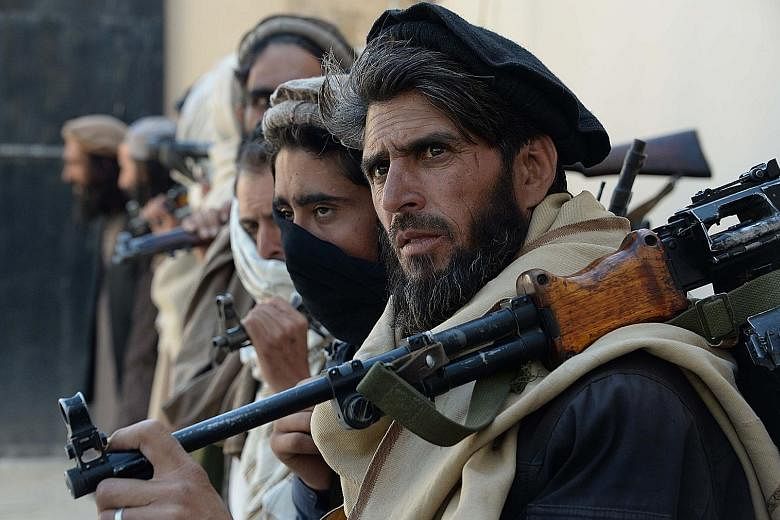KANDAHAR/KABUL • Overstretched Afghan forces are pulling back from violent southern districts without a fight, ceding key territory to the resurgent Taleban. The unprecedented "strategic retreat" has stoked fears that government control is slipping.
Beset by record casualties, desertions and troop shortages, Afghan troops have recently abandoned outposts in parts of central Uruzgan province, extending a withdrawal which began last month.
They have already pulled out of Musa Qala and Nowzad districts in neighbouring Helmand, bastions that foreign troops struggled for years to defend as the opium-rich region teeters on the brink of collapse.
The retreat has triggered fevered speculation about possible government backroom deals with the Taleban at a time when international efforts are growing to bring the insurgents to the negotiating table.
"Once you start pulling out troops and surrendering hard-won territory, you are admitting that the Taleban have won," said tribal elder Mohammad Ismail from Musa Qala, who fled the area after government troops pulled out.
"This is a betrayal to all those who have sacrificed their lives to defend these areas over 15 years."
The withdrawal, which comes as Afghan forces struggle to fight off the increasingly bloody insurgency, has sparked concerns that the government is fast losing control of volatile Helmand.
The Taleban effectively control or contest at least 10 of the 14 districts in Afghanistan's biggest centre for opium production, a lucrative source of insurgent funding, which makes the province a hotly contested area. But Afghan commanders dismiss claims of any Taleban deal, describing the recent withdrawals as a "tactical" manouevre to consolidate forces from isolated, hard-to-defend areas.
Many of the hundreds of withdrawn forces have been redeployed to beef up a security belt around Lashkar Gah, Helmand's capital which recently came close to falling to the Taleban, officials said. But many experts reject government claims that the withdrawal was a "strategic retreat".
"This new strategy is effectively a surrender to the Taleban. That's because there's no reason to think that this territory will be taken back anytime soon," said Mr Michael Kugelman, Afghanistan expert at Washington-based think- tank the Woodrow Wilson International Centre for Scholars.
"Afghan forces are overstretched and under-resourced. I can't see them being in a position to win back these areas," he said.
US military spokesman Brigadier-General Wilson Shoffner said the Afghan national army faces a huge manpower shortfall of about 25,000, making it necessary to cut back some outposts.
Government forces, which have been fighting without the full support of Nato since its combat mission ended in December 2014, are expected to abandon more checkpoints as fighting intensifies amid faltering peace efforts.
The Taleban on Saturday turned down peace talks, dealing a blow to international efforts to revive negotiations aimed at ending their 14-year insurgency.
The Taleban cited the increase in United States air strikes and Afghan government military operations for their refusal to participate in talks convened by the Quadrilateral Co-ordination Group comprising the United States, China, Pakistan and Afghanistan.
The militants said they had no intention of joining talks, expected to start this month in Islamabad, Pakistan, as long as Afghanistan was under what they described as foreign occupation.
The Taleban, ousted from power in a US-led military intervention in 2001, has been waging a violent insurgency to try to topple Afghanistan's Western-backed government and re-establish a fundamentalist Islamic regime known as the Islamic Emirate of Afghanistan.
AGENCE FRANCE-PRESSE, REUTERS, NEW YORK TIMES

